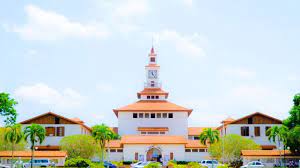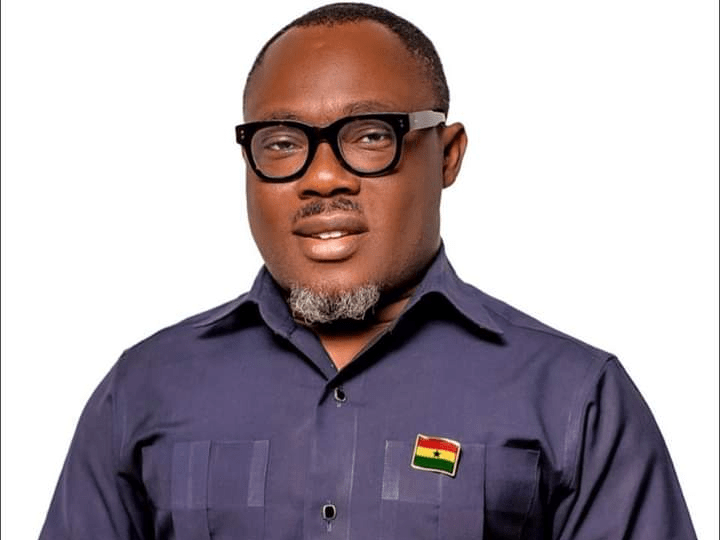
Dr Dennis Addo is by all indications an accomplished man. He is the founder and Chief Executive Officer (CEO) of the Claron Hospital and co-founder of Bisa, an international award-winning health app.
His hospital, located on a quiet street in the affluent Airport Residential area in Accra, caters for some of the country’s elite with deep pockets.
He is apparently so good at what he does that he was appointed to the board of the National Health Insurance Authority from 2017-2020.
Dr Addo, by all indications, is not a poor man. He is not a man in need and he’s certainly not someone who is so desperate to further his education to boost his life chances.
Yet, when he decided to pursue a degree in Public Administration in Harvard University, it was the Ghana government, through its Scholarship Secretariat, that paid USD50,031 for his tuition and living expenses in the United States in 2019.
That money came from a fund meant to help needy, underprivileged Ghanaian students to further their education. But for his political connections and social privileges, it is hard to imagine how a man with Dr Addo’s credentials, not to mention wealth, could be classified as needy and eligible to access a government scholarship to the tune of USD50,031.
Dr Addo describes himself as a pioneer member of the New Patriotic Party’s (NPP) students’ wing, TESCON. He recently contested in the NPP’s parliamentary primary at Atwima Nwabiagya South in the Ashanti Region but lost.
In addition to the government scholarship, Dr Addo was also awarded the Cheng Fellowship at Harvard in the course of his studies.
He did not respond to our email asking for comments.
While there is no explicit information on the financial benefits of Cheng Fellowship, Harvard University’s policy on fellows renumerations stipulates that “generally between $55,000 and $70,000” is paid “per year depending on experience and the nature of each Fellowship assignment.”

For his studies at Harvard, therefore, Dr Addo had two streams of financial support – one from the Scholarship Secretariat and the other from Harvard University. He was there for two years.
The Fourth Estate has found that Dr Addo is one of many politically-connected and social elites who have been competing with some of the country’s poor but brilliant students for funding from the Scholarship Secretariat. We could not reach him for a response.
Easy funding for the politically-connected, frustration for the needy
Many ordinary Ghanaians who apply for assistance from the Scholarship Secretariat have told us that they face a monumental hurdle in the shape of protocol lists that make it next to impossible for them to receive the support they need.
They had to compete with politicians, their relatives and associates, as well as socialites and diplomats.
After receiving numerous complaints from scholarship applicants, The Fourth Estate asked in March 2021 for data from the Scholarship Secretariat on those who have been awarded scholarships in 2019 and 2020.
The secretariat initially refused to grant the request, claiming the data was confidential. But the Right to Information (RTI) Commission ordered that personal information should be redacted and the data released. The Commission based its ruling on the premise that the scholarships were funded with public money.
The Scholarship Secretariat’s response to the RTI request showed that it had spent GHS237.5 million and GHS200 million in 2019 and 2020, respectively, covering both foreign and local scholarships.
The Scholarship Secretariat, an agency under the Office of the President, was established in 1960 with the primary purpose of providing local and foreign scholarships to academically gifted but financially needy students. Following the country’s liberation from colonial rule, the Nkrumah administration set up scholarship programmes as a means to incentivise and attract top talents to bolster the nation’s workforce by assisting citizens who lacked the financial means to fund their education.
In recent years, however, the secretariat has faced criticism for allegedly perpetuating patronage, often overlooking deserving applicants in favour of those with political and high society connections.
A major source of funding for the Scholarship Secretariat is GETFund. Section 2.2(b) of the GETFund Act requires the Scholarship Secretariat to allocate funds to support “gifted but needy students for studies in second cycle and accredited tertiary institutions in Ghana.”
In 2019-2020, the Scholarship Secretariat spent at least 291,480 pounds sterling (GBP), 146,502 US dollars (USD) and 7,685 Canadian dollars (CAD) on 20 influential individuals and the associates of the political elite.
For example, Gifty Oware-Mensah (née Oware-Aboagye), obtained a government scholarship of GBP18,450 to study at the University of Birmingham in the United Kingdom in 2020 to pursue an MSc in Development Policy and Politics. She was awarded the scholarship three years after she started working for the National Service Secretariat as Deputy Executive Director. In the same year, she acquired Berry Ladies FC, a female football club formerly known as Halifax Ladies FC, currently playing in Ghana’s women premier league.

When The Fourth Estate reached out to her on January 19, 2024, she denied receiving any scholarship.
“From 2019, my name has been Gifty Oware-Mensah. Let me call Kingsley [Agyemang] and get back. I don’t know what you’re talking about. Let me speak to them and get back to you.”
She later sent a text message that she was driving to Sunyani and would revert. Subsequent calls to her did not yield result.
Fawzy Ramadan, a relative and personal ass a relative and personal assistant to Second Lady, Samira Bawumia, was awarded GBP17,355 to cover the cost of tuition for an MSc in Global Supply Chain Management at Brunel University in the UK. However, Mr Ramadan never pursued the course because he claimed he was involved in an accident during the peak of COVID-19 and could not defer the course. Neither he nor the state benefitted in any way from the tuition fee paid to the Brunel University on his behalf. He said the school later wrote to him demanding the cost of accommodation from him when he had not stepped a foot on the university’s campus.

Then there is Michael Ofori-Atta Jr. The weight of political connections appears to have heavily favoured him, being a relative of President Nana Akufo-Addo and former Finance Minister, Ken Ofori-Atta. In 2020, the Scholarship Secretariat paid the University of Birmingham GBP16,740 for Michael to enroll in a programme called the Foundation Pathways – Social Sciences, Business and Law. The university describes the course as a “pathway that will lead its students into a number of possible undergraduate degrees” within its College of Arts and Law or College of Social Sciences.
We could not reach him for a response.
If social media posts extolling the virtues of the NPP and some of its big wigs count for anything, then they certainly did for Celestina Amoako Atta. The NPP youth activist was granted a GBP27,980 scholarship to study for an MSc in Information Business Management and Digital Business at the Coventry University in the UK in 2019. 
Ms Amoako Atta is currently an Assistant Administrative Officer at the Ghana National Petroleum Corporation (GNPC).
When The Fourth Estate disclosed the reason for reaching out to her during a phone call, she claimed she could not hear anything being said. She did not respond to subsequent calls.
According to data provided by the Scholarship Secretariat, a leading member of the NPP, Nana Poku Frefre was awarded a GBP28,080 scholarship to study for an MSc in Strategic Studies and Energy Security at the University of Aberdeen, United Kingdom in 2019. Mr Frefre, who is a founding member of the NPP branch in Scotland, told The Fourth Estate that although he got the Scholarship Secretariat award, he opted for a much better one from GETFund.
He is now the Head of New Media for the Ashanti Regional NPP Communication team and an aide to the Ashanti Regional Chairman of the NPP, Bernard Antwi-Bosiako, alias Chairman Wontumi.
Kelvin Ofori Gyimah joined the league of state-sponsored students in the UK in 2020 for a Master of laws (LLM) degree in International Human Rights Law at Brunel University at a cost of GBP17,355.
He is the current president of the NPP’s student wing (TESCON) in the UK.
Mr Gyimah is yet to respond to our requests for comment.
Amenyo Kwame Akoto is a Special Assistant to the then Member of Parliament for Mpohor, Alex Kofi Agyekum, received GBP17,355 for a Master’s programme in International Relations at the Brunel University in 2020. We could not reach him for comments.
If the curriculum vitae (CV) of Charles Asmah is anything to go by, then he was nowhere close to being a needy student when he received GBP28,380 for tuition and cost of living expenses during his studies for a Masters of Law degree in Legal Practice at the BPP University. At the time he secured the scholarship, his online resume showed that he was working as a finance and tax consultant at WhitePoplar UK Limited, and a lecturer at the College of Haringey also in the UK.
Mr Asmah is now a solicitor in the UK. Further checks showed that he has been living in the UK since 2008. He is also the NPP’s UK branch Treasurer.
He confirmed receiving the scholarship to The Fourth Estate. He, however, said he has been shuttling between the two countries. When The Fourth Estate asked if he was the Treasurer of the NPP in the UK, the line went mute, followed by shouts of “hello” from him, indicating he could not hear the question.
Just like Mr Asmah, Christine Ofosu-Ampadu has an impeccable resume. She is a private legal practitioner. She graduated with LLB and LLM degrees from the University of Kent in the United Kingdom and had a Bar Professional training education at Nottingham Trent University, also in the United Kingdom. She was called to the bar in New York in 2020. She worked as a crown prosecutor in the UK. With all these credentials she still needed USD6,570 from the Scholarship Secretariat to intern at the International Criminal Court in the Netherlands in 2019.
Ms Ofosu-Ampadu confirmed in an email to The Fourth Estate that she received the funds for her internship.
Another lawyer, Amma Frimpomaa Dwumah, received USD12,200 for a certificate in programme Implementing Public Policy at Harvard University in the United States in 2019. Ms Dwumah was appointed Managing Director of SIC Saving and Loans in July 2017. Before that, she was a legal practitioner with Dery & Co, a law firm owned by the former Minister of Interior, Ambrose Dery. She is a former NPP Womens Organiser for Asunafo North Constituency.
The Fourth Estate reached out to Amma Frimpomaa through her official email address but received no response.
Away from the legal gown, Raphael Patrick Sarfo is among the few who opted for professional development courses the state paid for. He received GBP5,995 for a course in Strategic Human Resource: Aligning with Corporate Vision. The Ashanti Regional NPP Youth Organiser attended Crown Agents Training and Professional Development in the UK in 2019.
When The Fourth Estate reached Mr Sarfo, he said thousands of people had benefited from similar scholarships and that he was not accountable to The Fourth Estate.
Children of the political & social elite.

In 2018, Nana Adubea Asante-Apeatu was in Ashesi University, one of Ghana’s most prestigious private universities, offering Computer Science. Ashesi is a distant dream for many Ghanaian parents because of its high fees and reputation for excellence. Many consider the university as the country’s version of an ivy league institution. The Computer Science programme at Ashesi cost GHS51,200 per semester now. But with a Ghana government scholarship, Nana Adubea, daughter of former Inspector-General of Police, David Asante-Apeatu, withdrew from Ashesi in 2019 and headed to the United Kingdom where she enrolled at the University of Aberdeen to study for a Bachelor of Law degree (with options in Computer Science). In 2019 alone, the state paid GBP27,480 for her tuition and living expenses.

In that same year, Zina Asante, daughter of actress and CEO of the National Film Authority, Juliet Asante, secured a place at Emmanuel College in the United States of America for a pre-medicine programme, costing USD41,026. The school described the course as “a launching pad towards a remarkable journey into the field of medicine.”
Zina was not the only beneficiary awarded a government scholarship to pursue a pre-med course. Nine others, including Araba Twumasi Mensah, the daughter of a former member of Parliament for Kwesimintim, Joe Mensah, also received funding for the same course. Miss Mensah took a pre-medicine course at the University of Oklahoma from 2019 to 2023. She got the scholarship at a time her father was a legislator. In 2019 alone, she received USD36,675 to cover her tuition and living expenses.
The reputation of a prominent politician and lawyer can effortlessly swing doors open for his children. It probably did for Adom Effah-Dartey, son of Captain Nkrabeah Effah-Dartey, a leading member of the NPP, a former MP and a former deputy minister of Interior in the Kufuor administration. In 2019, Adom was awarded a scholarship to study for a Bachelor of Law degree programme at the University of Hertfordshire in the United Kingdom. The Scholarship Secretariat paid GBP19,130 for the course.
Lucie Blay Ekeleba is a practicing lawyer and a daughter of Freddie Blay, the board chairman of the Ghana National Petroleum Company (GNPC), a former First Deputy Speaker of Parliament and until recently, the Chairman of the ruling NPP.
Her mother, Gina Blay, has been Ghana’s ambassador to Germany from 2017 to date. Her parents co-own the biggest private newspaper in Ghana—the Daily Guide. She received GBP5,933 to pursue a course that would qualify her to practice law in England and Wales. These funds went to the City University of London (GBP2,283) and Kaplan University College (GBP 3,650) in 2020.

Florence Akonor became Ghana’s High Commissioner to Malaysia in July 2022. Before then, she had received GBP4,037 for a programme known as the Executive Leadership in Action run by Crown Agents Training and Professional Development in the United States in 2020.
She is a career diplomat who has served in positions including head of chancery at the Ghana High Commission in India, Minister Counsellor at the Ghana Embassy in Ethiopia, Minister at the Ghana High Commissions in Canada and South Africa.
She confirmed that the Scholarship Secretariat sponsored the short course in the United States.
In the case of her peer in diplomacy, Mawutor N.K. Alifo, the state paid CAD7,685 for his Masters in Law programme at the University of Ottawa. Mr Alifo is a Foreign Service Officer who received the scholarship while in Canada. A year later, he acted as Ghana’s High Commissioner to Canada being the highest-ranking foreign service officer after the exit of the then High Commissioner, Nii Ayikoi Otoo.
Worthy investment?
The Scholarship Secretariat also invested 20,000 euros in a former Ashesi University student, Chelsea Naa Arday, to get a Master of Science degree in Luxury and Fashion Management at the Paris School of Business in 2019-2020. The beneficiary’s CV is not one that shows she is from a needy background.
Another 44,180 euros was spent on Innocentia Manza Norku, a former Systems Administrator at the Controller and Accountant General to pursue a Master’s in Food and Beverage Management at the College of Paris in France.
Discrepancies in criteria and guidelines
The GETFund Act, which makes funding available to the Scholarship Secretariat, explicitly stipulates that government scholarships are meant to support brilliant but needy Ghanaian students.
The Registrar of the Scholarship Secretariat, Dr Kingsley Agyemang, insists that this provision merely means that the primary criteria for receiving a scholarship are for the applicant to have a Ghanaian citizenship and an admission offer to a local or foreign university. The award of the scholarship has nothing to do with need, he claims.
While rejecting suggestions that scholarships are being wantonly awarded to those who are well-connected to the political and social elite, Dr Agyeman implied that recommendations from powerful persons and offices sometimes influence the award of scholarships.
“We live in a society where we are somehow connected in so many ways and it becomes difficult when we want to separate these little interactions.”
Despite Mr Agyeman’s insistence on the existence of selection guidelines, the Scholarship Secretariat failed to provide any document with such guidelines to The Fourth Estate. Repeated calls and Whatsapp messages requesting for the guidelines went unanswered.
Dr Clement Apaak, the deputy minority spokesperson on education, insists that using any criteria other than “brilliant but needy” to award scholarships, defeats the purpose of setting up the Scholarship Secretariat.

“When we bring in exclusive groups as being conduits through which scholarships can be given, then we are subjecting the process to abuse,” he said.
Prof Peter Quartey, the Director of Institute of Statistical Social and Economic Research (ISSER), agreed with Dr Apaak and noted that relying on recommendations to assess need is not good enough.
“For the politically-exposed people, they are Ghanaians. They pay taxes. They should meet the minimum standards that are set and they should all be part of the process,” he said.
“If we have an independent committee or board that assesses every application, they will all be given equal opportunity. When politically-exposed persons want to apply, they can apply – except when there is influence and they are the ones who benefit most.”

Dr Apaak, however, insists that influential or politically exposed persons and their close relatives should not be eligible to apply for government scholarships.
He asserted that it was not for nothing that tax laws are designed to positively discriminate in favour of the poor and added that the needy also deserve their fair share of opportunities offered by the state.
He described the offering of scholarship to influential people, children of the affluent and their associates as a form of greed. This, he said, has the tendency to widen the inequality gap between the rich and the poor in society.
“It is in their own interest not to continue to be greedy and selfish, where they can afford to educate their wards and yet they choose to let their wards benefit from scholarship that should be going to the wards of the less fortunate in society,” Dr Apaak said.
“Society ought to be designed in a way that [we] would always sacrifice collectively to bring up those who are down.”




